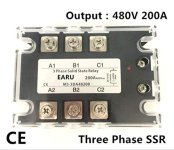- Joined
- Aug 31, 2001
- Messages
- 66,052
- Location
- South Bend, Indiana (near)
- Tractor
- Power Trac PT425 2001 Model Year
i cant agree more. Im an electrical contractor and even im bored.
I have several. They're just 3 triacs in a case with a single input.Have you ever seen a #phase solid state relay? Not likely, 'cause they would never unlatch! ;-)

I'm still mystified how any TWO legs of a three phase (120 degree) generator can supply usefull single phase power at anywhere near customary voltage.
CR. No disrespect intended, but what you said make no sense at all. Sure, at any given point in time, an AC wave goe to zero. How would them putting a meter, lets say across their load give them zero volts? Based on phase relationship? Of the wires? Huh?